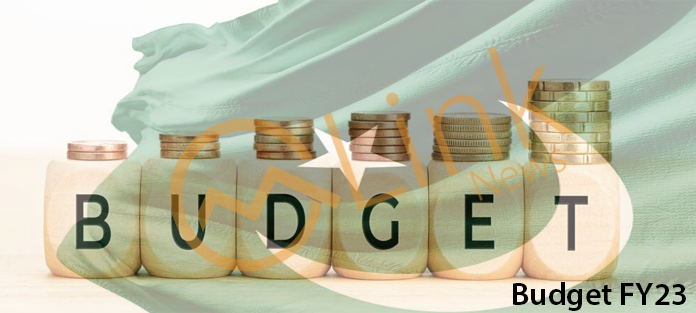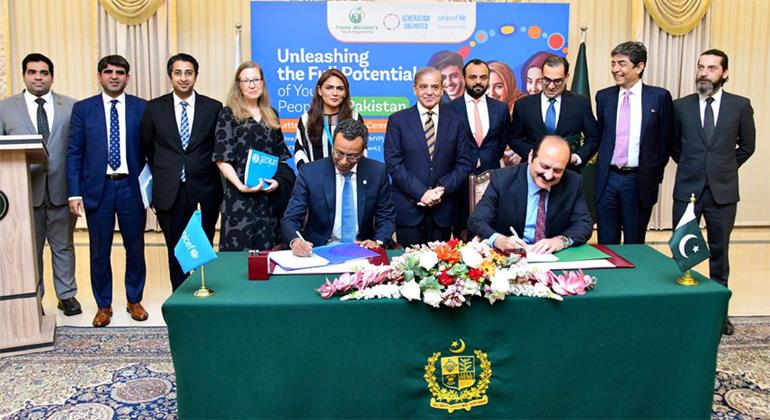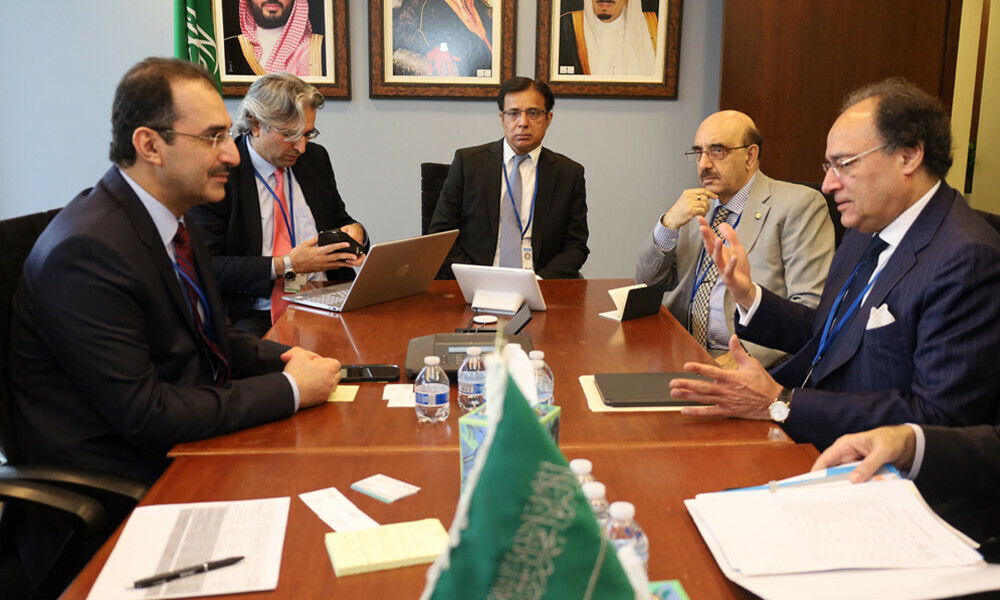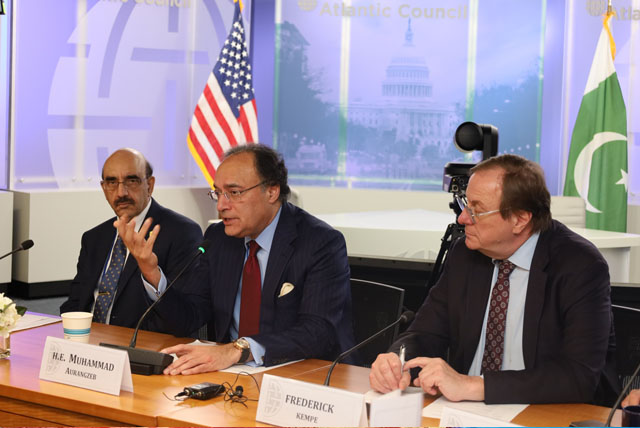June 10, 2022 (MLN): Federal Minister for Finance and Revenue, Mr. Miftah Ismail has presented the budget for the financial year 2022-23 in the federal cabinet session, aimed at containing twin deficits.
Since the budget for FY23 is also linked with the stalled International Monetary Fund (IMF)’s 7th review program, the coalition government has taken tough structural reforms.
The budget was being considered to be an austerity-driven budget.
The federal government has set a GDP growth target at 5% for FY23 to Rs78 trillion, the budget document revealed.
Salient features of Budget 2022-23
- The total outlay for budget 2022-23 is Rs9.50 trillion as against the budget of Rs8.5tr in FY2021-22.
- The fiscal deficit for FY22 has been reduced to 4.9% of GDP, down from 8.6% of GDP earlier while the primary balance which was -2.4% of GDP in FY22 has been improved to 0.19% in FY23.
- The government targets to keep inflation at 11.5%.
- The government has set Rs530bn for pensioners.
- The petrol quota for government officials will be cut by 40%.
- The target for the tax to GDP ratio has been increased to 9.2% from 8.6% earlier.
- Import target has been reduced to $70bn in FY23 from the estimated $76bn in FY22.
- Exports target has been set at $35bn in FY23.
- Federal Public Sector Development Programme (PSDP) has been estimated at Rs800bn.
- For remittances, the government has set a target of $33.2bn for FY23 against the expected $31.1bn in FY22.
- The government has allocated Rs1.52tr for defence expenditures, and Rs530bn for pension.
- The current account deficit has been targeted at 2.2% of GDP as compared to 4.1% deficit of FY22.
- Rs10bn has been allocated for the improvement of climate projects.
- The government has set interest payments at Rs3.95tr. Of which Rs3.4tr has been allocated for domestic interest payments and Rs511bn for external interest payments.
- Rs202bn has been allocated for Transport & Communications sector.
- The government has set a target of Rs699bn for targeted subsidies and Rs1.24tr as grants.
- The revenue collection target for FBR has been set at Rs7.004tr for FY23.
- Rs3,950bn for debt servicing has been allocated as compared to Rs3,144bn in FY22.
For Education, next year 10,000 students will get scholarships under the Benazir program, while Rs65bn has been allocated to Higher Education Commission.
Free laptops will be distributed on merit among students.
Allocation for the Benazir Income Support Program has been increased to Rs364bn as compared to 250bn in the last year.
A youth employment policy program will be started for the fresh graduates of Pakistan with a 25% women quota.
During his speech, he said that purchase of furniture has been banned for govt offices.
Rs21bn has been allocated for an increase in the production of crops and livestock.
Rs40.5bn DLTL claims to be released immediately by the FBR along with sales tax pending refunds.
The China-Pakistan Economic Corridor (CPEC) projects will be given additional funds to expedite their progress. The government has planned to focus its attention on the early start of the Special Economic Zones under the CPEC, he said.
Nine Special Economic Zones are to be established on the CPEC route.
In order to boost industrial growth, the government decided to exempt industrial feeders from power outages. It also raised the minimum tax bracket from Rs400,000 to Rs600,000 for small businesses.
The fixed income and sales tax regimes would also be introduced starting from Rs3,000 and less than Rs10,000 after that the FBR will not ask them for further taxes.
In this budget, taxable profits limit on saving certificates, pensioner benefits, and martyrs’ family welfare account investments are being reduced from 10 percent to 5 percent.
The non-filer tax has been increased from 100% to 200%.
A monthly Rs50,000 salary will not be taxed. Meanwhile, income tax slabs have been reduced from 12 to 7.
The tax rate on individuals and companies earning more than Rs300mn per year increased by 2% in the fiscal year budget 2022-23.
The taxable salary threshold increased from 600,000 to 1,200,000.
The taxable threshold for AOPs and business individuals increased from 400,000 to 600,000.
To promote the media & entertainment industry, the government has slashed the Sales tax on import of media and the entertainment industry to zero.
Tax on income from social media will be increased.
The minimum salary eligible for income tax has been increased to Rs1.2mn as compared to Rs 0.6mn to facilitate the salaried class.
Income exempted for AOP, Business Individuals has been increased to Rs0.6mn from Rs0.4mn
Income tax on Behbood certificates and Pensioners account has been decreased to 5% from 10%.
Fixed income and sales tax will be charged from small retailers. This tax will be collected through electricity bills amount Rs3-10K.
The immovable property will be taxed at 2% for filers, while 5% for nonfilers.
Tax evasion in the country is estimated to be Rs3,000bn.
More than 30 Active Pharmaceutical Ingredients (APIs) have been exempted from Customs duty.
Sales tax on the import of Sunflower, Canola, wheat, and seeds has been abolished.
Sales tax on tractors has been abolished to zero from 5% earlier.
Properties having a value of Rs25mn will have to pay 1% income tax on rental income which will be equal to 5% of the fair amount of the property. This tax will not be applicable for personal residence.
Custom and additional customs duties along 400 tariff lines have been rationalized.
Custom duty on agriculture machinery has been abolished.
15% capital gain tax to be charged on immovable properties sold under a one-year holding period.
The banking sector will be taxed at 42% from the current taxation of 39%. This includes the super tax amount.
Payments made through Debit, Credit, and Pre-Paid cards to foreign countries would be charged with 1% and 2% advance WHT for filers and non-filers.
Any person who is not resident in any country will be resident in Pakistan.
The advance tax of 1% on foreign transactions through debit/credit/prepaid card.
On the development side, Rs136bn has been allocated under PSDP for provinces, Azad Kashmir and Gilgit Baltistan.
Rs183bn has been earmarked for water and energy projects and Rs91bn for higher education.
Rs73bn has been allocated to the Energy sector for the improvement in transmission, distribution and production of electricity. Under this allocation, Rs12bn would be spent on Muhamand Dam.
To ease the common man’s life under Sustainable Development Goals (SDGs), Rs70bn has been earmarked, Finance Minister said.
Rs11bn has been allocated to Agriculture and Rs20bn for the K-4 project and Rs17bn for the Information and Technology sector.
To improve the country’s health system, the availability of treatment, Rs24bn has been allocated.
Minister stated that banks will provide cheap financing for the purchase of solar panels for households using less than 200 units of monthly electricity.
In the proposed budget, 250 stadiums will also be established.
Further, the salaries of govt employees will be increased by 15% against the proposed 10%.
Copyright Mettis Link News
33348







